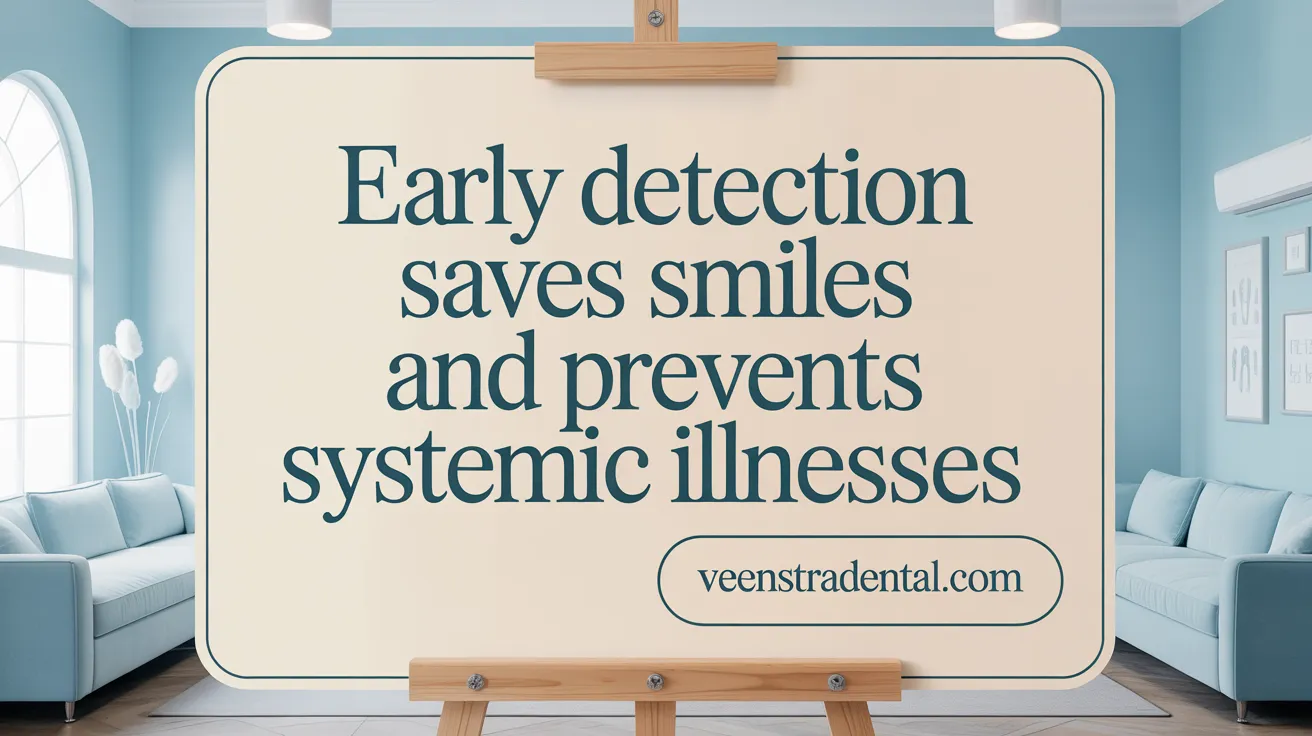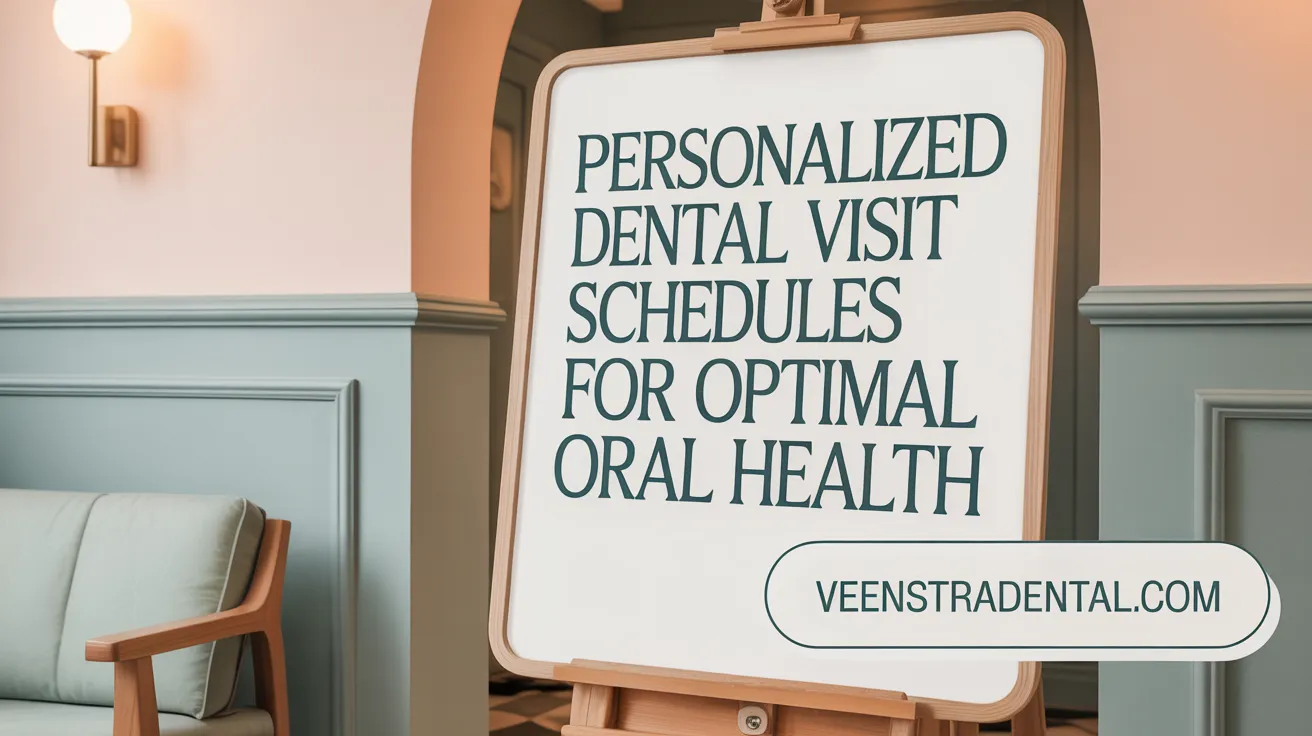Setting the Stage: The True Importance of Dental Visits
Dental health is more than just a bright smile—it plays a pivotal role in overall well-being. Despite this, many people underestimate the significance of routine dental checkups. This article delves into why these biannual visits are essential, going beyond the obvious, and uncovers their profound impact on long-term health and quality of life.
Early Detection: The Guardian Against Oral and Systemic Diseases

Why are early dental checkups crucial for health?
Early dental checkups enable detection of issues like cavities, gum disease, and oral cancer before symptoms appear, allowing for timely and less invasive treatments. Dentists can also identify signs of systemic diseases such as diabetes, osteoporosis, and heart conditions during oral examinations, which might otherwise go unnoticed (Oral health and overall health).
Early signs of dental problems
Many dental problems initially develop silently without pain or visible symptoms. Conditions such as cavities and gum disease often go unnoticed until they advance. Regular dental visits catch early warning signs — such as small cavities, gingivitis, or plaque buildup — enabling interventions that can prevent progression to more serious issues like tooth loss or periodontitis (Early detection of cavities and gum disease).
Detection of oral cancer and other health issues
Oral cancer screenings are a critical part of routine dental checkups. Dentists examine the mouth for lumps, abnormal patches, or sores that are painless in early stages but can develop into life-threatening conditions if missed. Routine exams also help identify other health concerns; signs of diabetes, osteoporosis, or nutritional deficiencies can manifest in the mouth, offering an opportunity for early medical referral (Detection of oral cancer signs).
Importance of screening beyond visible symptoms
Not all oral or systemic diseases show immediate visible symptoms or discomfort. X-rays and advanced diagnostic tools used during checkups reveal hidden decay, jawbone health, and tooth root problems. Additionally, dentists assess overall oral health and provide personalized guidance on managing risk factors like tobacco use, diet, and hygiene practices (Routine dental exams and personalized dental advice).
In summary, regular dental checkups serve as a frontline defense, detecting oral and systemic diseases before they escalate, improving treatment success rates, reducing costs, and supporting overall health and well-being (Benefits of Preventive Dental Care).
Comprehensive Preventive Care: What Happens During a Checkup?

Cleaning Procedures
During a dental checkup, a dental hygienist performs a professional cleaning which is essential for optimal oral health. This includes scaling to remove plaque and hardened tartar —substances that can’t be eliminated by regular brushing and flossing alone. Polishing follows, using a special toothpaste to remove surface stains and smooth the teeth. Professional flossing then removes residual debris between teeth. Often, fluoride treatments are applied to strengthen enamel and prevent cavities. These cleaning steps usually last about 30 to 60 minutes and help prevent gum disease and decay.
X-rays and Diagnostic Tools
X-rays are an important part of dental checkups and help dentists detect hidden issues like cavities between teeth, bone loss, impacted teeth, or jaw injuries that aren’t visible during a visual exam. Protective lead aprons are used during the process to minimize exposure. Depending on individual needs, X-rays may be taken every 6 to 36 months. Digital diagnostic technologies in dentistry improve diagnostic accuracy and comfort during these exams.
Oral Cancer Screening
A critical component of the dental exam is screening for oral cancer. The dentist checks the soft palate, tongue, throat, neck, and inside the mouth to detect abnormalities such as lumps or unusual patches that might be painless and easily missed without professional evaluation. Early detection of oral cancer during routine checkups can improve treatment outcomes significantly.
Personalized Dental Advice
Following examination and cleaning, dentists discuss overall oral health and habits with patients. They provide tailored advice on oral hygiene, diet, smoking cessation, and messages to improve dental health. Cosmetic concerns such as teeth whitening or orthodontic options may also be addressed. The dentist reviews risk factors like medical history and lifestyle to recommend appropriate checkup intervals and preventive care plans (Importance of Regular Dental Visits.
What Procedures Typically Occur During a Dental Checkup?
A dental checkup typically includes professional cleaning performed by a hygienist; scaling, polishing, flossing, and fluoride application are standard. The dentist then conducts a thorough oral examination, including an oral cancer screening, evaluates X-rays for unseen problems, and offers personalized recommendations based on the patient’s needs.
Regular dental checkups thus combine clinical cleaning with advanced diagnostics and personalized care to safeguard oral and overall health effectively.
Frequency and Personalization: How Often Should You Visit Your Dentist?

How often should individuals visit the dentist for checkups?
Most people are advised to schedule regular dental check-ups twice a year for exams and professional cleanings. These routine dental visits help maintain oral health by removing plaque and tartar and allow dentists to detect issues like cavities, gum disease, and oral cancer early when treatment is simpler and more cost-effective.
Recommended frequency of visits
While a biannual schedule fits the general population, certain individuals may require a tailored approach. Some people with excellent oral health may extend visits to once a year, whereas others with specific conditions need closer monitoring. These recommendations align with frequency of dental checkups guidelines provided by dental professionals.
Risk factors affecting visit intervals
Patients exhibiting risk factors such as tobacco use, uncontrolled diabetes, active gum disease, high sugar diet, or pregnancy often need more frequent dental checkups, sometimes every two to six months. These tailored intervals help prevent disease progression and manage oral health proactively, as explained in dental checkup frequency recommendations.
Special considerations for children and high-risk groups
Children should have their first dental exam by their first birthday or when their first tooth emerges. Following this, visits every six months to one year are recommended to support proper dental development and hygiene education, according to dental visits statistics and guidance for children.
High-risk groups, including smokers, pregnant women, and individuals with chronic diseases like diabetes or immune system disorders, are encouraged to maintain more frequent visits. This personalized schedule helps catch oral health problems early, ensuring better outcomes as supported by dental care for high-risk groups.
In summary, while six-month intervals are standard for most, visit frequency must be personalized based on individual health profiles and risk factors for optimal dental care as detailed in importance of regular dental visits.
The Cost-Effectiveness and Health Impact of Routine Dental Visits

Why are regular dental checkups a cost-effective health strategy?
[Regular dental visits](https://www.dentalhealth.org/blog/the-importance-of-regular-dental-visits) act as an affordable preventive health measure by catching dental issues early, such as cavities and gum disease. Early detection limits the need for expensive restorative treatments like root canals, crowns, or tooth extractions. Preventive care, which includes professional cleanings, fluoride treatments, and dental sealants effectiveness, costs significantly less than managing advanced dental problems.
Economic benefits of prevention
Preventive dental care helps avoid complex procedures associated with worsening oral conditions. Skipping checkups increases the likelihood of serious decay, gum disease progression, and tooth loss, all of which require costly and invasive treatments. Insurance plans typically cover two annual cleanings and exams, making preventive visits accessible and financially sensible. Early treatment preserves natural teeth, reducing the need for prosthetics like bridges or dentures, which carry long-term expenses.
Avoidance of complex treatments
Professional dental cleanings and routine exams remove plaque and tartar that daily brushing cannot eliminate, preventing cavities and controlling gum inflammation. Regular screenings enable dentists to intervene before oral problems escalate, thus sparing patients from painful and extensive dental work. This proactive approach limits not only dental costs but also the time and discomfort associated with advanced treatments.
Overall health benefits related to dental care
Maintaining oral health through routine dental care positively impacts general health. Gum disease is linked to systemic conditions such as heart disease, stroke, and diabetes. By treating gum inflammation and controlling oral infections, regular dental visits reduce these health risks. Additionally, dentists can detect early signs of oral cancer and other medical issues during checkups, allowing for timely intervention and better health outcomes.
Regular dental checkups are therefore a strategic investment that ensures healthier smiles, lowers the likelihood of expensive treatments, and supports overall well-being.
Building Trust and Accessibility: Key to Lifelong Oral Health

How does the dentist-patient relationship influence dental health?
The dentist-patient relationship is fundamental to maintaining dental health. A strong, trusting bond encourages open and honest communication, allowing patients to share concerns and symptoms they might otherwise overlook. This openness leads to personalized treatment plans that address specific oral health needs effectively.
Compassionate care from dental professionals fosters comfort and reduces anxiety, making patients more likely to attend regular checkups. When patients feel cared for and understood, they are motivated to maintain consistent dental visits, which are crucial for early detection and prevention of oral health problems.
Improving accessibility of dental care
Accessibility plays a vital role in encouraging regular dental visits. Modern dental practices that offer flexible scheduling, affordable treatment options, and family-friendly services remove common barriers to care. This approach ensures that people of all ages, including children and elderly patients, can receive timely preventive and restorative dental treatments.
Community-based clinics and online tools that assess individual risk factors also assist in personalizing care. By making dental services convenient and approachable, patient adherence improves significantly, contributing to better oral health outcomes.
Encouraging regular attendance through compassionate practice
Dental practices that prioritize patient comfort and understanding help build lifelong habits. Compassionate dentists and hygienists listen carefully, provide clear explanations, and support patients through dental anxieties or past unpleasant experiences.
This empathetic environment increases the likelihood of patients returning for routine exams and cleanings, which is vital since regular check-ups prevent complicated and costly dental issues while promoting overall health.
Together, trust, accessibility, and compassionate care form the foundation for sustained oral health and well-being.
Making Routine Dental Checkups a Priority for a Healthier Future
Routine dental checkups are fundamental not only to maintaining oral health but also to safeguarding overall well-being. Through early detection, comprehensive preventive care, personalized visit schedules, cost-effective treatment, and building strong patient relationships, these visits serve as a cornerstone of holistic health maintenance. Embracing regular dental visits is an investment in a healthier, more confident future for individuals and families alike.
